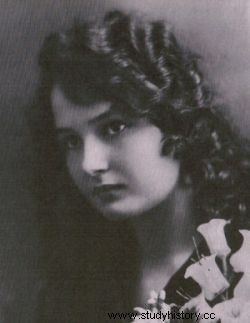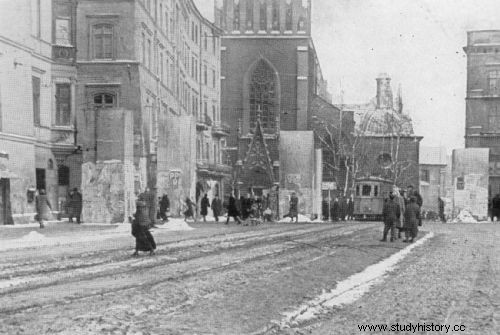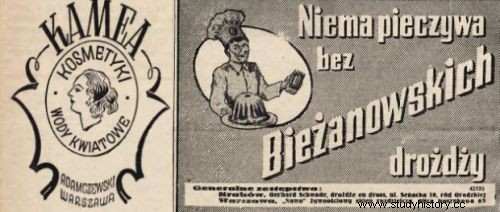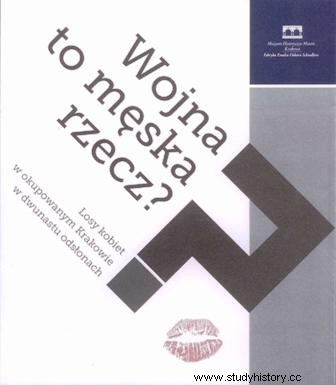War is supposedly a male thing, and women are not fit to grab bayonets and rifles. In fact, however, there is also a struggle behind the front lines. War sneaks into every nook and cranny of life and turns everyday life upside down. He conspires here, he sells tissue paper there, he follows the blackmailer all day long
When the city of Krak was taken over by the Germans, the reality of its inhabitants changed beyond recognition. The capital city of the General Government, which suffered little damage as a result of hostilities, seemed peaceful compared to the rest of the country. However, appearances are deceptive. At every turn, the signs shouted Nur f ür Deutsche! , crowds of enormous swastikas frightened, and crowds of refugees reminded of the prevailing hopelessness. What could women from Kraków who were in such a difficult situation do? Staying yourself.
To be a woman, to be a woman…
It has been known for a long time that it is difficult to subjugate wealthy and educated people. The German occupation authorities were well aware of this, and therefore they strove to pauperize the population of the conquered areas. The Nazis hoped that the indifferent, hungry and ragged Poles would capitulate to the new realities. However, they did not foresee that simple pride and self-respect, additionally encouraged by underground organizations, would only force their victims to redouble their efforts to always look nice and tidy.

Pelagia Filka. One of the Cracovians mentioned in the article (photo from the catalog "War is a male thing?", Historical Museum of the City of Krakow, 2011).
The Germans were unable to eradicate the pre-war elegance which was especially visible among women, regardless of nationality. A woman, used all her life to the fact that taking care of a decent appearance testifies to a person, knew that it is not proper to show herself to people with dirty face and hands, unkempt hair and unkempt clothes. Besides… beauty has not ceased to be an asset in the eyes of men.
The women of Kraków, regardless of the war realities, took care of themselves all the time, showing incredible ingenuity. Overcoming, among other things, the difficulties of acquiring new clothes, they remained attractive and elegant. Torn blouse - no problem! After all, the parachute canopy is also white. There is enough work and a stylish blouse is ready. Old skirt? A bit of invention and we already have a brand new outfit. It happened, however, that there was nothing to buy new clothes for or anything to change. Back then, a greater shame than the threadbare sleeves and chafing on the knees was walking in dirty or wrinkled clothes.
Women paid attention not only to the outfit itself, but also to the skin and hair. When the purchase of elegant cosmetics was close to a miracle, you had to deal with it somehow. Most often, ladies produced them themselves, less often they bought them from someone else. Suddenly mothers and grandmothers found their way. They remembered about Mother Nature's rich pharmacy. Taking care of one's appearance played a special role among the Jewish women hiding on the Aryan side of the city. First, it testified that they did not give up and, despite poverty and despair, they still believed in themselves. Second, it could literally save a life. More than once it was necessary to completely change the appearance of a woman in hiding. Dyed, with elegantly curled hair, made-up and smartly dressed, a Jewish woman did not arouse suspicions in the street, as a dirty and scoundrel escapee from the ghetto would do.

The gloomy everyday life of the occupation? All Saints' Square in the early 1940s…
Amors and entertainment in times of horror?
When the world turns upside down, the homeland disappears from the map, and someone improperly diversifies the ordinary gray everyday life, one cannot just sit in a corner and pray for the resurrection of the country. There are a thousand or more household chores to do, and the conspiracy awaits new recruits. But that's not all. Sometimes you have to throw off all this fear, preferably with your friends. Or maybe a chubby cherub with a bow and arrows in her hand will smile by the way?
Throughout the occupation, various kinds of social events were very popular. Most often, these were meetings combined with dancing, which even took place in the ghetto. They went to the cinema (it is not true that only traitors and volksdeutsche did it!) And to conspiratorial theaters. The underground theater company was established in the home of one of the protagonists of the exhibition "War is a male thing?" The Historical Museum of the City of Krakow, Pelagia Bednarska. A secret photo studio also operated in this premises at 24 Lubicz Street, in front of the police station and the main railway station.

Janina Jasicka. One of the inhabitants of Krakow described in the article (photo from the catalog "War is a male thing?", Historical Museum of the City of Krakow, 2011).
There is also the romantic-emotional issue. Despite the war and terror, there were many young people in the city. The noble women never forgot about the future of their daughters. Even in this situation, they tried their best to marry them off. Interestingly, descriptions of love conquests and courtship have been preserved in many war memoirs . Anyway, let the numbers prove that love has not receded into the background. Despite all the perturbations that occupied Krakow, the number of marriages in relation to the period before the outbreak of the war did not decrease .
101 dishes from nothing, or how not to starve
War always means many inconveniences for the civilian population, including problems with food supplies. Often deprived of the support of a male arm, women assumed the role of heads of families. It was up to them to provide for their loved ones. The prices of the staple products were crazy, and often you couldn't get them anyway. This is how hundreds of potato dishes were born (even peels if necessary!), Coffee production without the use of coffee, or baking cakes without eggs, flour and sugar. Coffee was made of acorns, for example, roasted on a stovetop . The tea was so rare that the trade in… used coffee grounds flourished. Various substitutes with even a similar taste were also used, e.g. apple, carrot and caramel extract.
Attention! You are not on the first page of the article. If you want to read from the beginning click here.
Tadeusz Czekalski also mentions several other striking achievements of military cuisine in "Customs in Poland": The former bean legumina was called a bean cake, and after adding almond oil to it, an "almond cake" was created. The cake made of stale card bread was a treat which you dried, ground and then added sugar and eggs. Due to the lack of dried fruit, nuts or almonds were replaced with golden brown oat flakes. In 1940, a special, occupational cookbook was even published, which explained, for example, how to prepare fish soup ... without fish .

Collaborative newspapers - as if nothing had happened - advertised cosmetics, food or even luxury products. Everything that could only be accessed by volksdeutsche (clippings from "Goniec Krakowski", January 5, 1941).
Hardships of provisioning
To get food issued on cards, you had to have both luck and money. Whoever failed had to look elsewhere. Several times a week, many women made the perilous expedition into the countryside in search of goods for trade and food. This is what another heroine of the aforementioned MHK exhibition, Janina Jasicka, did. Her toil was that she marched to the Rock, about 20 kilometers from Krakow. She bought flour, groats and pork fat on the spot. On the way back, she carried a backpack weighing up to several dozen kilograms. Fortunately, she managed to get false documents confirming work in a German company dealing in the purchase of herbs. Thanks to this, she was able to move around the city and its surroundings relatively freely, and trips for food were no longer so dangerous.

"Occupational Krakow of Women" is another article that we are publishing as part of our cooperation with the Historical Museum of the City of Krakow. It was created, inter alia, on the basis of the catalog "War is a man's thing? The fate of women in occupied Krakow in twelve scenes "published by this institution in 2011, on the occasion of the exhibition, which can still be seen at the Schindler's Factory.
Having new papers, Jasicka started to earn extra money by selling haberdashery and home-made shopping bags. Well, she's not the only one. The Cracovians gained their livelihood in various ways. If any of them retained any part of their pre-war property, acquired a valuable item, or made something suitable for trade, she went to Tandeta with it ( the number of customers and traders there reached 20,000! ) or Kleparz, two bustling marketplaces. It doesn't matter that on a market day, round-ups were sometimes organized there. There was nowhere else to find hard-to-find items. The occupation song, known from the movie "Zakazane melodie", among others, is perfect here:
Now it's war
who trades this alive!
If I sell chop, bacon, black pudding
I will also drink moonshine.
Instead of ending
During the occupation, everyone fought as best they could. While most did not conspire, there were other ways to resist, and the most effective was not to lose hope. Despite the war and the terror that happened to them, the inhabitants of the occupied Kraków remained strong women. They fought the enemy, did not give up and tried with all their strength to create for their family, and often strangers, taken in from the goodness of their hearts, a substitute for normality and a sense of security. Because contrary to what Churchill allegedly said, war is not only a man's thing.
Sources:
- War is a man's thing? The fate of women in occupied Krakow in twelve scenes , Historical Museum of the City of Kraków, 2011.
- Tadeusz Czekalski, Modern times [in:] Customs in Poland. From the Middle Ages to the present day , Polish Scientific Publishers PWN, 2005.
See also
- Forgotten crimes. Mass executions in Krakow during World War II
- A second too late! The Home Army's assassination attempt on the life of Hans Frank
- She sent hundreds of Jews to their deaths. She took the money for it. She was Jewish herself
- An anti-Semite and a homophobe. The real face of Coco Chanel?
- August '44:Warsaw is fighting, Krakow is building dykes for the Nazis?
